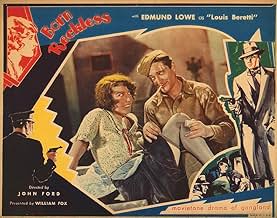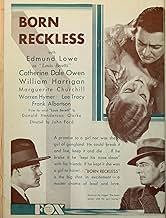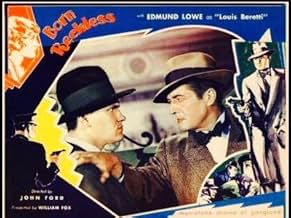Füge eine Handlung in deiner Sprache hinzuHoping to use the publicity to get re-elected, a judge sentences a notorious gangster to fight in the war.Hoping to use the publicity to get re-elected, a judge sentences a notorious gangster to fight in the war.Hoping to use the publicity to get re-elected, a judge sentences a notorious gangster to fight in the war.
Empfohlene Bewertungen
Better than earlier Ford's but still bad. Flat with so many wasted opportunities to make it better. The plot was reused several times in movies to come and nearly all were vastly superior.
Born Reckless (1930)
* 1/2 (out of 4)
John Ford drama about a wannabe gangster (Edmund Lowe) who gets busted after a heist but instead of going to prison, the judge makes a deal with him. Instead of jail the man will enlist for WW1 and if he serves his country proudly then the judge will throw out the evidence against him. This all goes well and the man returns home a war hero but he soon learns that his old gang has killed his brother in law so he goes out for revenge no matter what it might cost him. In the end, this film is killed by its standard and routine screenplay, which tries to do way too much and it doesn't do any of them in any original form. The movies tries to mix the gangster genre with a war genre with an added touch of the revenge drama but all three are boring and don't feature anything we hadn't seen countless times in the silent era. I've never been a fan of Lowe but he actually comes off decent here and plays the role off as well as can be expected. The supporting cast, including Lee Tracy, are all standard and forgettable. The climax of the movie is certainly the best thing and Ford's use of a swinging door leads to a great thing but there's nothing else going on here.
* 1/2 (out of 4)
John Ford drama about a wannabe gangster (Edmund Lowe) who gets busted after a heist but instead of going to prison, the judge makes a deal with him. Instead of jail the man will enlist for WW1 and if he serves his country proudly then the judge will throw out the evidence against him. This all goes well and the man returns home a war hero but he soon learns that his old gang has killed his brother in law so he goes out for revenge no matter what it might cost him. In the end, this film is killed by its standard and routine screenplay, which tries to do way too much and it doesn't do any of them in any original form. The movies tries to mix the gangster genre with a war genre with an added touch of the revenge drama but all three are boring and don't feature anything we hadn't seen countless times in the silent era. I've never been a fan of Lowe but he actually comes off decent here and plays the role off as well as can be expected. The supporting cast, including Lee Tracy, are all standard and forgettable. The climax of the movie is certainly the best thing and Ford's use of a swinging door leads to a great thing but there's nothing else going on here.
"Born Reckless" did not strike me as an appropriate title, but the original title of the story from which this movie came was simply "Louis Beretti," even more meaningless.
"Born Reckless" starts right out with action and even gunshots, but moves rather slowly throughout. But remember, this is an early sound picture, and in that context, it is very well done.
Locations range from New York to the World War I battlefield of France and back, from urban New York to the countryside, and the look we get of the era makes "Born Reckless" valuable, if not an entirely entertaining motion picture.
It has an excellent cast, with Edmund Lowe the star. He was a good actor but is little known today.
However if you look carefully, you will see the biggest star of all time ... but you have to look VERY carefully. In fact, I never did see John Wayne, although he is listed in the "uncredited" cast here at IMDb.
Quite visible, although also uncredited, is the great Randolph Scott. Also visible is the great Ward Bond, who is given billing but is on-screen in about two scenes.
Known well to John Ford aficionados is Jack Pennick, quite visible also, and whose presence always added so much. Another future cowboy star I didn't see is Bill Elliott, uncredited.
Playing the sister of the Lowe character is Marguerite Churchill, who had a couple years before co-starred with John Wayne in "The Big Trail," and it must have been interesting to be on this set with him as an unbilled extra.
Lowe's character is not especially likable, and probably the most likable character is the newspaper guy, played by Lee Tracy.
The cast alone makes "Born Reckless" very worth watching, even though the story is not very pleasant. It is, though, an interesting look at the World War I and Prohibition era America which, added to the cast, should entice you into watching.
I do recommend it, having watched it On Demand from Time Warner Cable. There is a trailer for it at YouTube.
"Born Reckless" starts right out with action and even gunshots, but moves rather slowly throughout. But remember, this is an early sound picture, and in that context, it is very well done.
Locations range from New York to the World War I battlefield of France and back, from urban New York to the countryside, and the look we get of the era makes "Born Reckless" valuable, if not an entirely entertaining motion picture.
It has an excellent cast, with Edmund Lowe the star. He was a good actor but is little known today.
However if you look carefully, you will see the biggest star of all time ... but you have to look VERY carefully. In fact, I never did see John Wayne, although he is listed in the "uncredited" cast here at IMDb.
Quite visible, although also uncredited, is the great Randolph Scott. Also visible is the great Ward Bond, who is given billing but is on-screen in about two scenes.
Known well to John Ford aficionados is Jack Pennick, quite visible also, and whose presence always added so much. Another future cowboy star I didn't see is Bill Elliott, uncredited.
Playing the sister of the Lowe character is Marguerite Churchill, who had a couple years before co-starred with John Wayne in "The Big Trail," and it must have been interesting to be on this set with him as an unbilled extra.
Lowe's character is not especially likable, and probably the most likable character is the newspaper guy, played by Lee Tracy.
The cast alone makes "Born Reckless" very worth watching, even though the story is not very pleasant. It is, though, an interesting look at the World War I and Prohibition era America which, added to the cast, should entice you into watching.
I do recommend it, having watched it On Demand from Time Warner Cable. There is a trailer for it at YouTube.
John Ford continues to be flummoxed by early sound while Edmund Lowe is a sorry case for an Italian in this hackneyed mobster pic. Spitting one tough guy cliche after the next it fails to even approach the onslaught of classic gangster films (Little Caeser, Public Enemy, Scarface) with more convincing leads that would follow over the next year.
Louis Berretti (Lowe) is about to get sent up the river when a judge gives him an option to go to war instead, which he accepts. Upon return he goes straight and opens a club but his loyalty to his old pals remains and a spat between factions threatens to ruin his future.
As in his previous Black Watch, Ford seems confounded at getting anything but stilted performances out of his actors. The wooden Lowe is dreadfully miscast, looking more upscale financier than slum grown with the rest of the characters outside of a buoyant Lee Tracy not worth mentioning for their own good.
There are some tense moments and limp attempts at humor but Ford's ham fisted direction squanders them in this flaccid gangster pic devoid of the violent passion that would infuse the aforementioned films waiting in the wings.
Louis Berretti (Lowe) is about to get sent up the river when a judge gives him an option to go to war instead, which he accepts. Upon return he goes straight and opens a club but his loyalty to his old pals remains and a spat between factions threatens to ruin his future.
As in his previous Black Watch, Ford seems confounded at getting anything but stilted performances out of his actors. The wooden Lowe is dreadfully miscast, looking more upscale financier than slum grown with the rest of the characters outside of a buoyant Lee Tracy not worth mentioning for their own good.
There are some tense moments and limp attempts at humor but Ford's ham fisted direction squanders them in this flaccid gangster pic devoid of the violent passion that would infuse the aforementioned films waiting in the wings.
With such fluid epics as "The Iron Horse" (1924), "Lightnin'" (1925), "Hangman's House" and "Four Sons" (both 1928) in his resume, it is surprising that Fox would encumber Ford with a dialogue director over and over, but Fox did. In '29's "The Black Watch" it was Lumsden Hare. Andrew Bennison is credited with the stage direction of "Men Without Women" released January 1930. Judging from the result Bennison achieved in "Born Reckless" (released in May 1930), I'm astonished anyone would have given him a second chance.
The photoplay opens with a traveling camera shot of a parade. The camera prowls into a jewelry store where a heist is in progress. Outside, the cops "get wise" when a stolen truck is discovered. An exiting shootout and chase ensues, with our hero, Louis Berretti, gaining refuge at his parents' apartment. Then Bennison's stuff takes over. Well, molasses in Anchorage moves better and the pace of the film congeals. Berretti faces justice (eventually) and is "sentenced" to join the war effort overseas. John Ford stages some excellent sequences here, with Berretti's approbatory service delivering him home a hero. He opens a nightclub which, unfortunately, keeps Berretti rubbing elbows with his old mob and allows plenty scenes filled with Bennison-helmed hubris. The dialogue is not only awkward with head-shaking gaps, but has characters with names like Big Shot putting people "on the spot" [murdered].
Audiences of 1930 could not fast forward but you can and should. Edmund Lowe's performance is nothing like the smooth "Chandu" of a year later and probably should be skipped over to view Ford's impressive set pieces. The swamp at the picture's conclusion cribs Fox's "Sunrise" but remains impressive for an early talkie. I gave it a 7 for Ford's contributions. On the whole, though, this is the kind of film that gave early TV viewers a bad taste for early talkies. Viewers beware.
The photoplay opens with a traveling camera shot of a parade. The camera prowls into a jewelry store where a heist is in progress. Outside, the cops "get wise" when a stolen truck is discovered. An exiting shootout and chase ensues, with our hero, Louis Berretti, gaining refuge at his parents' apartment. Then Bennison's stuff takes over. Well, molasses in Anchorage moves better and the pace of the film congeals. Berretti faces justice (eventually) and is "sentenced" to join the war effort overseas. John Ford stages some excellent sequences here, with Berretti's approbatory service delivering him home a hero. He opens a nightclub which, unfortunately, keeps Berretti rubbing elbows with his old mob and allows plenty scenes filled with Bennison-helmed hubris. The dialogue is not only awkward with head-shaking gaps, but has characters with names like Big Shot putting people "on the spot" [murdered].
Audiences of 1930 could not fast forward but you can and should. Edmund Lowe's performance is nothing like the smooth "Chandu" of a year later and probably should be skipped over to view Ford's impressive set pieces. The swamp at the picture's conclusion cribs Fox's "Sunrise" but remains impressive for an early talkie. I gave it a 7 for Ford's contributions. On the whole, though, this is the kind of film that gave early TV viewers a bad taste for early talkies. Viewers beware.
Wusstest du schon
- PatzerAt the start of the film there are two gangsters burgling a jewelry store. One turns on a flashlight and the other chastises him for turning on the flashlight and then swats at it. But as he is chewing him out, the flashlight stays lit for about 4 seconds. A truly professional criminal would known better to have left that light on for those 4 seconds. A truly profession criminal would have swatted at the light first to get it out as quickly as possible, then, and only then, would he have reamed the torch bearer out.
- Zitate
Louis Beretti: Say, this room ain't big enough for both of us. This town ain't big enough. If you ever bump into me, you better see me first, you dirty, sneaking rat!
- SoundtracksOver There
Composed by George M. Cohan
Top-Auswahl
Melde dich zum Bewerten an und greife auf die Watchlist für personalisierte Empfehlungen zu.
Details
- Laufzeit
- 1 Std. 22 Min.(82 min)
- Farbe
- Seitenverhältnis
- 1.20 : 1
Zu dieser Seite beitragen
Bearbeitung vorschlagen oder fehlenden Inhalt hinzufügen
































